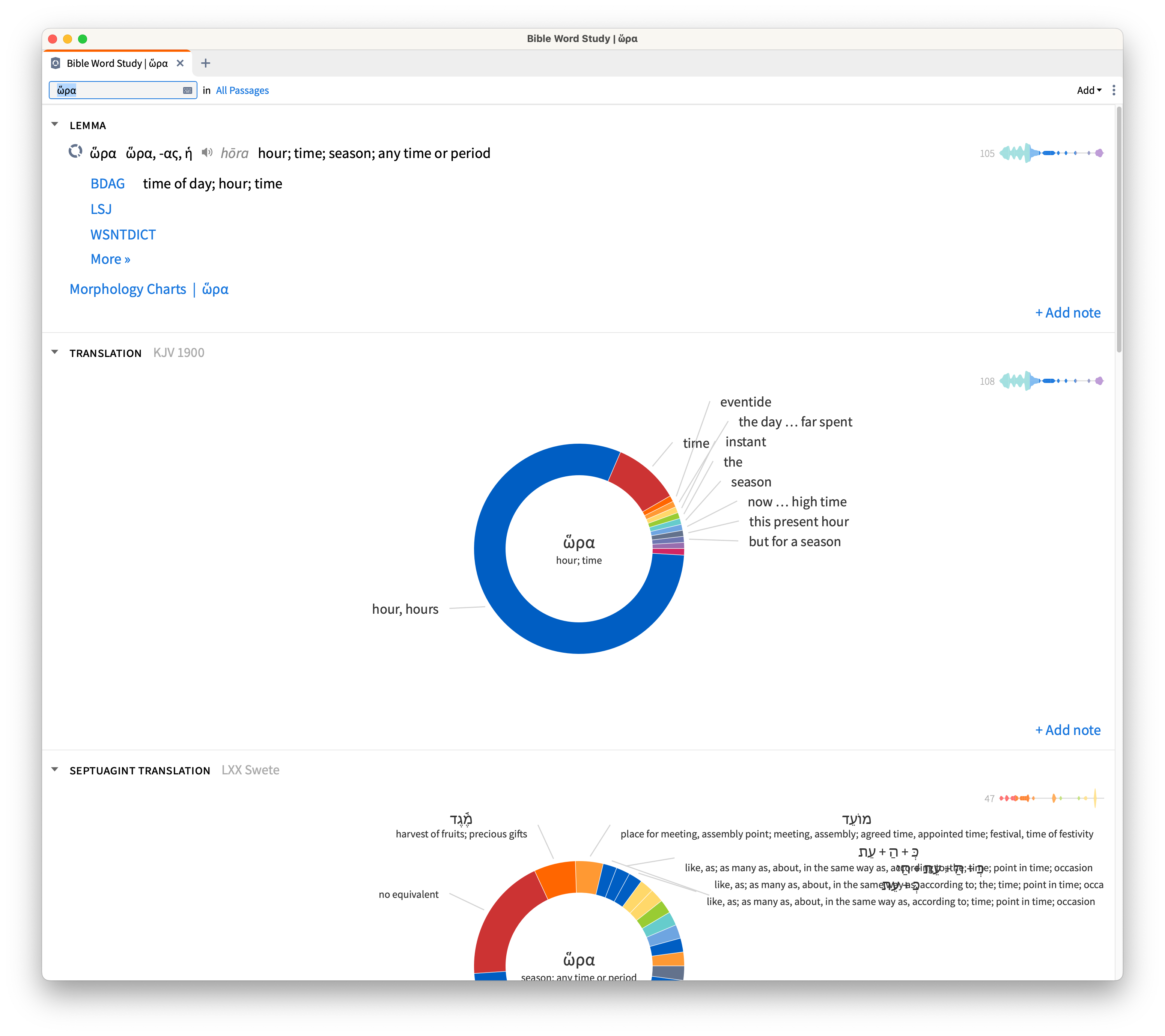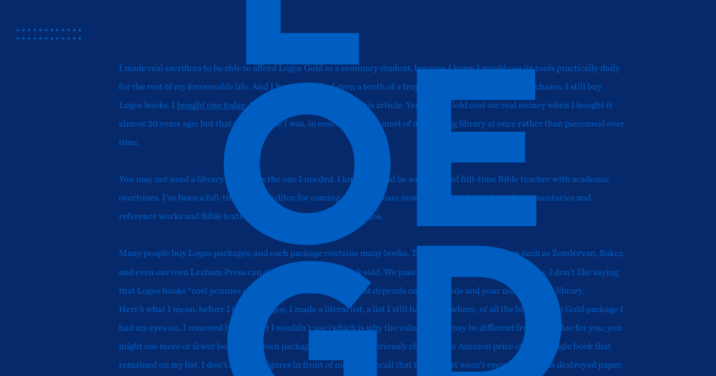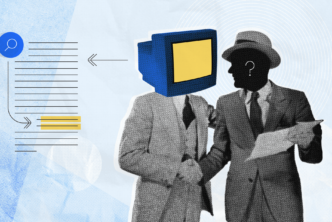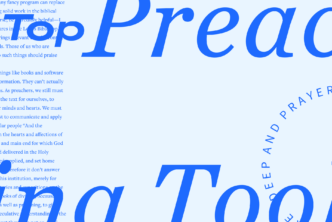Why is Logos so expensive? People out there kind of mock us for it, and I’m here to admit that we feel a little sensitive on this point. Babylon Bee, for example, had a headline a few years back:
When this came out, my colleagues and I laughed one of those nervous laughs that you laugh when you’re the butt of the joke but find it socially awkward to display your true feelings.
Because there are answers to the question of why Logos costs so much.
Five answers.
Answer 1: It doesn’t
It actually doesn’t cost so much. The free edition of Logos is, well, free—and if you get on our various free monthly books email lists, you can build up a nice little library with zero financial outlay. The heart of people who work at Logos is to serve the church; I know that’s my heart. We also get millions of hits at app.logos.com, which is free, and doesn’t even require you to create an account.
Logos Fundamentals is $49.99; our brand new Disciple packages are also very reasonably priced (Essentials, Standard, Premium). We know that not everyone needs a theological and biblical studies library the same size as their pastor’s.
Answer 2: It’s the books that drive up the cost
Logos features do cost money, but if you look at our most expensive packages, the real difference is the number and value of books they include. Logos Portfolio, for example, costs so much money because of the books it comes with—books we have to pay publishers to use. To be clear: Logos costs more or costs less depending on how many books you buy with it. (Last I checked, the same goes for paper books that are worth having.)
As a seminary student, I made real sacrifices in order to afford Logos Gold because I knew I would use its tools practically daily for the rest of my foreseeable life. Decades later, this has proven true. I still buy Logos books. I bought one today. For me, Logos Gold was worth it. Depending on your vocation, profession, or interests, you might not need a library as large as the one I needed, so Logos will not be as expensive for you.
Answer 3: Books are cheaper in Logos packages
Books make Logos packages more expensive, but Logos packages make books more affordable.
Logos helps you benefit from Costco-like economies of scale. Here’s how that works: many people buy Logos packages, and each package contains many books. That means that publishers such as Zondervan, Baker, and even our own Lexham Press can charge less for each book sold because they know they’ll sell more. We pass those savings on to our customers.
I don’t like saying that Logos books “cost pennies on the dollar,” because their cost depends on your needs and your usage of your library. Before I bought Logos, I made a literal list—a list I still have somewhere—of all the books in the Gold package I had my eyes on. I removed books I felt I wouldn’t use (which is why the value for me may be different from the value for you: you might use more or fewer books in a given package—or less or more expensive books), and then I laboriously checked the Amazon price of every single book that remained on my list. I don’t have the figures in front of me, but I recall that the contest wasn’t even close. Logos beats paper.
Answer 4: Reference works are more valuable in Logos
Logos destroys paper in another way. When in the course of my training it became necessary to get BDAG, the premier Greek-English lexicon for New Testament study, I asked my Greek professor whether I should go paper or digital. He said paper. He was wrong. I’m sorry, but paper proved so unwieldy that I quickly sold it and bought the digital version, which let me look up word entries with a simple search function. Even people with an express preference for a physical book in their hands will occasionally make an exception for reference works.
Paper BDAG is a beautiful book—but so is digital BDAG in Logos. Paper BDAG costs real money—so does digital BDAG. But I use it far more often in Logos than I would if I had the paper version. It is quite literally worth more to me in Logos than in paper.
Answer 5: The Logos ecosystem brings significant value to every book
And that brings me to my fifth and final answer: my books have more value to me as part of the Logos ecosystem.
Logos is a business, and it operates like one, not like a donor-based nonprofit. This business model is more effective at producing a high-quality product. The money that Bible students spend on Logos goes to producing specialized tools of all kinds that deliver lasting value to Bible students and scholars. I get frustrated when I can’t use the simple-but-powerful tools in Logos—like when I have to cite a book I have only in Kindle. Or when I have to type out by hand a footnote for a paper book. When that regrettable occurrence intrudes upon my digital life, I feel the same impatient, get-on-with-it feeling I feel when older generations give me directions instead of an address. Do you know how amazing it is for a writer/editor in an academicky space to have auto-generated footnotes?
1Here’s another example of the value Logos adds. BibleWorks—Logos’s former competitor, and a piece of software I myself long loved—had a “Use” tab that was really quite handy. It basically searched the whole Bible for any given Greek or Hebrew word every time you hovered over that word in a Bible text. But it also gave me a bare list with no organization and only one kind of information. The Logos Bible Word Study, designed by our designers and developed by our developers, is one of the tools I turn to more frequently than any other. I’ve never gotten tired of how beautifully and usefully it presents word-usage information—plus basically all the other things I want to know about a given Bible word, all in one convenient and quick report.

I really could go on and on about what the interconnectedness and availability of Logos books does for my efficiency. The extensive tagging that makes my Bible texts, especially, so much more useful, is just huge to me. And time would fail me to tell of the value of having my library with me wherever I go on all my devices.
But, you know, this is the internet, so I’m not going to let time fail me; I’m going to fail it:
- Once, when I heard a preacher at a church I was visiting make a rather questionable use of Job 31:35–37, I was able to use Logos on my iPad to silently check multiple translations and commentaries during his message to prove to myself that I was not the crazy one.
- And in this remote-work world in which I do a lot of work from coffee shops—and even some on planes and in hotels—I never have to give a moment’s thought to whether or not I will have the books I need for any writing or teaching I have to do. Almost my entire theology and biblical studies library (I do still have some physical books!) goes with me everywhere I go in the world.
Conclusion
I work at Logos because I’m driven to help others interpret the Bible responsibly. And at the end of the day, I think the product is its own best argument. Several times I have purchased books in Logos that I either already owned in paper or had free access to online. The Works of Jonathan Edwards are a signal example: they’re all free at the Yale site (the fruit of the work of Ken Minkema and his amazing Jonathan Edwards Center, at which I took a class once). They’ve been free online for years. But the site is rather difficult to use,2 and I finally just bought the set in Logos so I could have it in a much more convenient format.
And with Logos 10, you can add your paper book library into the software so that you get search results from your paper books. And future releases of Logos promise more help for serious students of Scripture.
- It’s amazing, I’m telling you. Here’s a book I’ve read that has “amazing” in the title—footnote generated automatically by Logos: Jonathan Aitken and Philip Yancey, John Newton: From Disgrace to Amazing Grace (Wheaton, IL: Crossway, 2007).
- I’m sorry, but donor- or grant-supported software often ends up being just like this.






